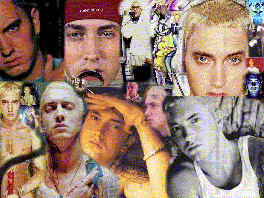Posted on March 6, 2001
Eminem Is From Mars
... and so are the people who love him
by
Daniel Clark
"We live in an age of political correctness where you can't say this or that," said Elton John, in defense of his new chum, Eminem. "I honestly don't think people will go out and start beating and killing people because of this album."
"I like the fact that Eminem is brash and angry and politically incorrect," Madonna added. "At least he has an opinion."

Is anybody buying this? Coming from these people? Madonna, after all, has been bent on molding herself into a real-life Murphy Brown. Mr. John, meanwhile, has busily become the leading transatlantic distributor of sensitivity. There's nothing politically incorrect about these two at all -- nor is there, really, about Eminem.
Probably out of embarrassment, liberals have tried to expand the definition of "political correctness" to encompass all social standards. Under this definition, anything that makes a lot of people mad is said to be politically incorrect. What political correctness really is, as it was conceived on Ivy League campuses, is an effort to create a new paradigm throughout society by stigmatizing the ordinary, and normalizing hypersensitive liberal nitwittery.
In order to be politically incorrect, something must inflame left-wing activists, but appear innocuous to most of the rest of society. Things which were frowned upon before political correctness arrived aren't politically incorrect; they're just things which are considered bad. Referring, for example, to grown women as "girls" is politically incorrect. Saying the things about them that Eminem does, on the other hand, is just plain despicable.
Although feminists have been conspicuously quiet about the Eminem controversy compared to gay activists, it is women, not homosexuals, who are the primary target of his anger. His award-winning album, The Marshall Mathers LP, is riddled with graphic images of violence toward women. Most notable is one selection entitled Kill You, in which the rapper fantasizes about raping and killing his mother, through such colorful lyrics as, "I ain't even drug you in the woods yet to paint the forest." The album contains numerous references to rape, incest and wife-beating, all of them related in the first-person, and sometimes accompanied by female voices screaming and choking in the background.
One would expect that NOW president Patricia Ireland and other feminist leaders would be more than a little miffed by all this. Assuming, however, that they are, this has been a curious time for them to suffer a media blackout. Ms. Ireland and friends can usually summon reporters and cameramen with a snap of the fingers, yet they somehow escaped the throngs of media at the Grammy awards, who had no trouble at all finding members of groups like the Gay and Lesbian Alliance Against Defamation.
GLAAD and other gay activist groups dispatched representatives to the Grammys to protest their icon Elton John's decision to perform a duet with Eminem, who they say encourages violence against homosexuals, a charge against which Mr. John defends him. It's difficult to see where there's room for dispute here. Eminem's tirades against gays aren't nearly as grotesque as those against women, but they're hardly tame. It seems, from his references to "boy-girls" wearing makeup, that he perceives gays (or effeminate men he assumes to be gay) as pseudo-women, and therefore suitable stand-ins as targets for his anger.
There's a difference, though. There are snippets from Eminem's album which could be understood to suggest that he actually wants some degree of acceptance from homosexuals. All he seems to want from women is that they scream, bleed and die.

Near the end of Kill You, a violent fit thrown by Eminem at his mother in particular, and women in general, he drops in a strangely out-of-context remark about homosexuals, in which he complains that they "keep eggin me on, til I have you at knifepoint, then you beg me to stop?" Elsewhere on the album, he uses weapons as phallic symbols. Might he be doing the same here, and therefore be expressing anger toward gays because they reject him? The Marshall Mathers LP is rife with such ambiguities.
In a piece simply entitled Marshall Mathers, he rants extensively against homosexuals and "sissies," but interrupts himself long enough to lament, "Whatever happened to catchin a good ol-fashioned passionate ass-whoopin and gettin your shoes coat and your hat tooken?"
On another track called Amityville, Eminem is joined by an old band-mate of his called Bizarre (real name: Rufus Johnson) from the Detroit-based rap group D12 (a.k.a., The Dirty Dozen). Bizarre introduces himself by bragging that he'd raped one of his male cousins. It seems that as long as homosexuality is confined to the context of abusive prison-like encounters, Eminem and friends are not especially averse to it.
If that seems difficult to believe in light of Eminem's outward hostility toward gays, consider that he frequently rails against effeminate-looking men, while at the same time adorning his own wispy frame with bleached blonde hair and two earrings.
Is it contradictions such as these which have led Elton John to embrace Eminem, or is it that he shares his animosity toward women? That's a fair question to ask, since the sensitive one says he "was in hysterics from laughing" when he first listened to the album. (Which was most hilarious, Elton: the rape, the wife-beating, or the recurring image of a dying woman stuffed in the trunk of a car?) There has also been the suggestion (cynical, I know) that he did it for the money, motivated by his famously uncontrollable, lavish spending. Indeed, the increased airplay he's enjoyed since appearing at the Grammys ought to keep him supplied with ermine steering wheel covers and pearl-handled lint brushes for at least another three or four months.
At the awards show, Mr. John and Mr. Em performed a selection called Stan, in which an overzealous fan writes a series of frustrated letters to his favorite rap star. The letters reveal that their author, Stan, has developed a homosexual attraction toward the rapper. As one letter after another goes unanswered, Stan becomes more and more unstable, until finally, he commits suicide by driving his car off a bridge -- with his pregnant girlfriend tied up in the trunk, of course. The sympathetic rapper eventually writes back, though tragically too late, encouraging Stan to seek counseling.
If there's any strain that runs through The Marshall Mathers LP more pervasively than Eminem's hostility, it's the theme, stressed in Stan, as well as in exercises in self-pity like The Way I Am and Who Knew, that he is not responsible for any apparent influence that he and his albums may have.

The Eminem Defense, as manifested in his lyrics, and in remarks by him and his supporters, consists of three major points: (a) Eminem's lyrics are only words. He's never raped or killed anybody ... or as Melissa Etheridge put it, "Look, Eminem is not out chopping off any gay men's heads"; (b) He is not responsible for what kids might do while imitating him. It's not his fault if parents aren't doing their job; and (c) People who think he is promoting hostility toward women or anyone else just don't get it. Eminem's lyrics are the words of fictitious characters he devised, and are not reflective of the opinions of the real Marshall Mathers.
Defense (a) is based on a phony premise. Nobody has accused Eminem of actually carrying out the violent perverted fantasies from his album. He's only been criticized for writing and saying those things, and marketing them to impressionable kids, which he's done. So Eminem has never raped or killed anybody. What does he want, an award? Oh ... never mind.
Argument (b) rings true up to a point. Of course parents are responsible for protecting their children, but that doesn't mean that the things they must protect them from are blame-free. This isn't to say that Eminem should be prosecuted for his lyrics, but would it be so unreasonable to expect the rest of the music business to ostracize him, instead of giving him trophies?
Point (c) is easily the most intriguing of the three. Eminem contends that the things he says on his albums come not from him, but from characters he's created. Therefore, he says, their words are not necessarily his, and should be taken "with a grain of salt."
Most of the more violent outbursts on the album are attributed to "Slim Shady," a character Eminem developed in his days with D12, a band made up of six members who assumed two identities each. So you see, Eminem should not be held responsible for these lyrics, because he is not Slim Shady. In fact, he isn't Eminem either. Eminem is only a nickname derived from Marshall Mathers' initials. Since he usually appears in public as Eminem and seldom as Mathers, he must figure there is practically nothing he can do or say for which he can be held responsible.
Mathers' claims that he uses these characters as part of a satire fall flat, because he makes no discernable satiric point. He only hides behind his pseudonyms, like a child blaming all his misdeeds on an imaginary friend.
If we are, for whatever reason, to accept Mathers' explanation that his lyrics are not characteristic of himself, then what are we to make of the fact that he entitled his album The Marshall Mathers LP, and that it includes a piece called Marshall Mathers, which one would naturally presume is narrated by Marshall Mathers himself?
Then there's the inconvenient presence on the album of an ultraviolent screed entitled Kim, in which the narrator fantasizes about murdering his wife. As it happens, Mathers' wife (who recently filed for divorce -- go figure) is named Kim.
But then, there are lots of women in the world named Kim ... and who knows, perhaps Marshall Mathers is just another pseudonym. For all we know, his real name could be Buford, Percival or Clive. Maybe we'll never know his true identity. We do know for sure, though, about the identity of his defenders and apologists.
(S.C.): Those people are just a bunch of grimy, perverted, sewer-dwelling, runny-nosed, vermin-ridden, warty, fat, homely chowderheads.
Please note the initials which preceded that last statement, which indicate that these are not my words, but those of Sam Cinderblock, a character I invented who says really mean things about people. Sam does not speak for me, and since he is fictitious, his words should be taken -- how would a misunderstood poetic genius put it -- "with a grain of salt." So I hope nobody stupidly interpreted them as an insult.
The Shinbone: The Frontier of the Free Press
Mailbag . Issue Index . Politimals